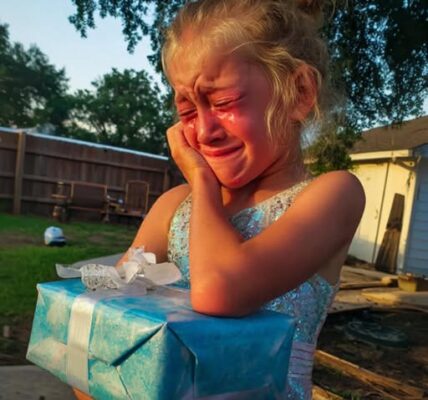The Extra Stick Figure In Her Drawing Wasn’t Imaginary—And What It Revealed Changed Everything
“A 4YO in my class was showing off her drawing. There was a stick figure for Mommy, Daddy, little Sis, herself, and… one more. They’re a family of 4, so I inquire about the fifth stick figure, and the artist casually replies, ‘That’s my other mommy.’”
At first, I chuckled. I assumed she meant a make-believe friend or maybe even a favorite babysitter. Kids say all kinds of odd things when they’re young. But something about the way she said it—calm, assured, like obviously this other mommy was part of the family—stuck with me. Her little brow furrowed when I didn’t get it right away. She even tapped the paper again and said, “She lives with Grandma sometimes. But she visits me when Daddy’s not home.”
It wasn’t my place to pry. I work at a small Montessori preschool in a quiet suburb outside Asheville, North Carolina. Our policy is to gently redirect when kids wander into sensitive topics. But I’m also human. Curious. So later that day, I brought it up with Ms. Marisol, our assistant teacher, when we were wiping down tables.
“Did you see Liora’s drawing?” I asked casually. “Five people in her family.”
Marisol laughed. “Yeah, I saw. Maybe she’s counting a pet?”
“No,” I said, lowering my voice. “She said it was her other mommy. Who lives with Grandma and visits when Daddy’s gone.”
Marisol’s rag stopped mid-wipe.
I saw something flicker behind her eyes. A knowing pause.
“You remember her parents, right?” she said slowly. “Tall guy, dark hair, always in a suit. Mom’s sweet, quiet? Comes to pick-up in yoga pants?”
I nodded. The dad, Jamil, had this way of filling up the hallway—loud voice, expensive watch, always rushing. The mom, Zahra, was more reserved. Soft-spoken, always smiling nervously.
“Well,” Marisol went on, “a couple months ago, I overheard Zahra talking to another mom. Something about ‘being watched too closely at home’ and how she missed having her own space. It didn’t sound like normal mom talk.”
I felt my stomach flip.
But I let it go. Sort of. For about a week.
Then on Friday, during free play, Liora came up to me again holding a different drawing—this time, it was a house with two rooftops connected by a rainbow. “This one’s my mommy’s other house,” she said. “She likes it better than Daddy’s house.”
I blinked.
“Sweetheart,” I said gently, “where is this house?”
“With Grandma,” she replied, like it was obvious. “And with Auntie Nasrin. She lets Mommy wear her dresses.”
There was something fragile and eerie in the way she said it. Like she was repeating things she’d overheard late at night, maybe whispered behind closed doors.
That evening, I couldn’t stop thinking about it. So I did something I normally never do: I looked Zahra up on social media. I remembered her last name because it was hyphenated—Zahra Alavi-Kent.
Sure enough, her profile was public.
There weren’t many recent posts, but one caught my attention right away. A photo of Zahra sitting in what looked like a sunroom, her face lit up like a woman half her age. The caption read: “Finding light again, slowly but surely. #healing #safeplace”
The location tag? Burnsville. About an hour’s drive up into the mountains. And guess who was tagged in the photo?
Nasrin Alavi.
Her sister. Or—if Liora was right—possibly more than that.
I scrolled further and found older pictures from a year ago. All family stuff. Birthday cakes. Beach trips. Then, suddenly, nothing. A black hole between August and January. The next post after that was one of Zahra holding Liora at a park with the caption: “No matter what, I’ll keep showing up for her.”
It started to paint a story I hadn’t expected.
Now here’s the thing: I don’t gossip about parents. It’s a hard line I stick to. But concern’s a different animal. I wasn’t looking to judge—just to understand. Because kids pick up everything. They draw their emotional world in crayons and glitter glue, and it’s often more honest than what adults say out loud.
That Monday, I noticed something else. When Jamil came to pick up Liora, she hesitated. Most kids sprint into their parent’s arms. She just stood there until he called her a second time—louder. And when he reached for her hand, she flinched. Not dramatically. Just a small recoil. Like muscle memory.
My heart thumped hard.
A few days later, Zahra came instead.
I’d never really spoken to her one-on-one. But I made an excuse to linger near her during pick-up, commenting on Liora’s love of art.
“She’s always drawing,” Zahra said with a quiet smile. “It’s how she processes.”
And before I could stop myself, I said, “She told me about her… ‘other mommy.’ She said you visit sometimes when Jamil’s not home.”
Zahra’s face froze.
For one long second, I thought I’d crossed a huge line.
But then, to my shock, she let out a breath. Almost a laugh, except it sounded like it had been caught in her throat for months.
“She told you that?”
I nodded. “She’s very articulate for four.”
Zahra glanced toward the playground. “She’s been trying to tell people in her own way. I didn’t think anyone would hear her.”
We sat down on the low brick wall by the gate. It felt like something invisible had just cracked open between us.
“She’s right, you know,” Zahra said softly. “I am staying with my mom. And Nasrin.”
“Is Nasrin…?”
“She’s my person,” Zahra said simply. “We were best friends in college. Lost touch. Reconnected when things at home started falling apart.”
I didn’t interrupt.
She went on, voice steadier now.
“Jamil’s not a bad father. But he… likes control. I stopped wearing what I liked. Stopped seeing my friends. Even my sister. Everything had to be explained, justified. I thought I was protecting Liora by staying. Until Liora started mimicking his tone. Asking me if I ‘deserved’ things.”
Goosebumps crawled up my arms.
“So I left. Not forever, not legally. Just… to breathe.”
That night haunted me in the best way.
Over the next few weeks, Zahra showed up more. Picked Liora up early sometimes. Brought her homemade snacks. One day, she even stayed to help paint sets for our spring showcase.
Then, just as suddenly, Jamil stopped coming.
Marisol said she overheard one of the aides saying he’d had some kind of “incident” at work. HR complaint. No one had details, but the word suspension floated around.
Two weeks later, Zahra came in holding an envelope and looking like she hadn’t slept.
“Custody meeting,” she whispered. “Wish me luck.”
I hugged her. I never hug parents. But she needed it.
The very next week, Liora walked in with a drawing. This time it had just three figures: herself, Zahra, and Nasrin. Holding hands. A sun overhead.
“No Daddy?” I asked gently.
She shook her head. “He’s going on a trip.”
Zahra later confirmed—Jamil had taken a job in Atlanta. They’d agreed on a temporary long-distance schedule while lawyers figured things out.
Three months passed.
Summer bloomed. Liora started humming more. She danced during storytime. Even Marisol noticed. “She’s lighter now,” she said one morning. “Like her shoulders aren’t holding up the whole house anymore.”
Then came the twist I didn’t see coming.
Zahra invited the staff to a picnic at her mother’s house. Said it was just a small thank-you for our support.
When I pulled up to the property, nestled high up in Burnsville, I gasped.
It was the house from Liora’s rainbow drawing. Two rooftops. A greenhouse in back. Wind chimes dancing on the porch.
Inside, the sunroom looked just like the one from Zahra’s post.
But what caught my breath was the photo on the mantle.
It was Zahra and Nasrin.
Not as sisters, not posed. Just two women sitting barefoot on a dock, heads leaned together, laughing like they knew something sacred.
And underneath it was a wooden frame that read: Chosen Family is Still Family.
Zahra caught me looking.
“She insisted we frame that one,” she said, nodding at Liora, who was twirling in the grass with a paper crown.
“Do people ask questions?” I asked quietly.
“Always,” she said. “But I’m done whispering. Liora’s already teaching me how to be brave.”
That evening, I sat under the stars sipping mint tea. There was music, laughter, the smell of grilled corn. No tension. Just peace.
And for the first time in a long time, I felt like I’d witnessed something holy. Not loud or dramatic—but quietly, defiantly real.
Here’s the lesson I walked away with: sometimes the truth comes in crayon. In the bold, unfiltered honesty of children who haven’t learned to lie yet. And sometimes, listening to them isn’t just the kind thing—it’s the right thing.
So if a kid draws something that doesn’t “fit,” don’t dismiss it. Ask. Listen. You never know who’s whispering through their tiny hands.
And as for Zahra? She didn’t need saving.
Just someone to believe her.
If this touched you, share it with someone who needs to be reminded: the truth has a funny way of showing up in unexpected ways. ❤️


